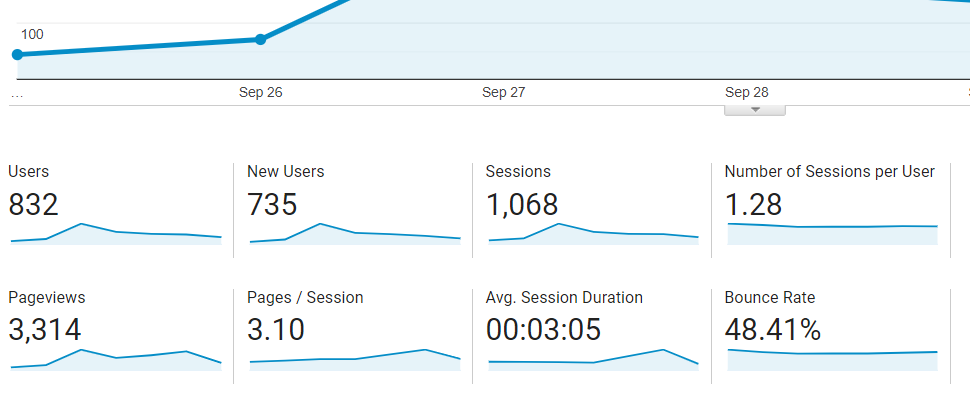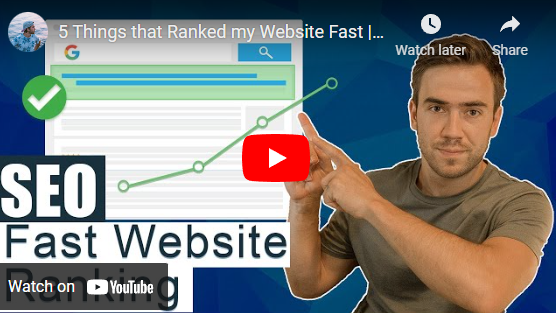The first website I ever built (Using Wix) ended up ranking on the first page of google within 3 months. I knew nothing about SEO and just learned how to use WIX. The only thing I had was a book called “The Art of SEO” which I had just purchased at Barnes and noble and a Can-Do attitude.
Applying all the concepts I was learning from the book I had my website indexed with google and all the basic on page SEO complete within a few weeks. My website Had all the correct meta tags, title tags, and optimized content based on some keyword research I had completed for my industry.
Beyond Basics
With all the basics complete, i needed to do something to speed up the process of my SEO and show google why my website was worthy of ranking above established competitors.
In this article I’ll cover 5 things that helped me outrank my competition. While the market does change, these tactics still apply to SEO today.
With that being said, let's take a look at the things that helped me outperform the competition.
#1 - Google Ads

When a website is first built, it will take some time to establish credibility & page authority with google. Search engines want to know how people interact with your website before they recommend it. Without a good ranking I used google search ads to pay for my original traffic.
This did require some initial investment but because of paid traffic I was able to get my site on page one immediately. This little push at the beginning allowed google to collect stats on my website early and see how people responded to my content.
Google is much more likely to rank a website when it already knows people respond well to it, how can google know people like your content when you have no visitors? See my point?
Traffic + Happy visitors = Search Engines Trust.
#2 - Reviews
Because my website was for a location based business I was able to use reviews to gain Google’s trust. Google takes reviews from local listings into serious consideration in order to give users the best results.
My competitors were much more established than me so they already had lots of reviews from years prior. However, they were not intentionally trying to gain more reviews, at least not effectively. Because I saw this as a strong signal to google I made it a point for employees interacting with customers to mention reviews. Never incentives or offer anything in return, but just mention that if they gave feedback online it would help our business.
Well it didn't take long for hundreds of reviews to pour in from sites like yelp, google plus, yahoo local, etc. This had a tremendous effect on local rankings!
#3 Website Articles
The more content you have on your website the easier it is for google to know what your business is about, plain and simple.
For local business this could be a bit more challenging due to the lack of resources or content idea’s people will care to read and for google to index. It took some time but after doing some research on what users may be searching up I found plenty of ideas.
Here are some general topics I wrote about, the website was for a locksmith company:
- "Tips on how to unlock your own car"
- "What should you pay for locksmith services"
- "Locksmith services general pricing breakdown"
See how I’m going after what users actually care about and may search up? Many businesses make the mistake of writing horrible content or talking about themselves. Hate to break it to you but people don't care about your business as much as you think.
#4 - Modernized Website (Session Duration & Bounce Rate)

While doing some research on my competitors, the first things I noticed were the outdated ugly websites. Many of these businesses had been established years ago and looked like they haven't updated their website in 5 years. The vibe I got immediately felt like I walked into a wine cellar no one has been in for years.
I knew that if I was able to create something cleaner and made it look like it was updated regularly, customers would have a better experience on the website, therefore improving my “Session Duration” and “Bounce rate”. People still argue to this day if google still considers this metric, regardless of what they say I promise you it helps.
#5 - Split Testing User Experience
My final point will repeat a little from point #4 regarding Session Duration and Bounce Rate. Once you complete your website its not enough just to sit back and wait. I watched very closely how users interacted with my content.
Resources like Google analytics let you see what pages users visit, how long they stay on each page and much more.
By watching the traffic on my website I was able to change things up constantly and see if it improved or hurt the user experience. Split testing is simply the process of trying two different versions of the same thing. One day I would test “Landing page #1” and the next I was try “Landing page #2”. If one page outperformed the other I would simply scrap the one that didn't work and repeat this process.
Takeaways
- Don't try to outsmart google
- Think about the user
- Google cares about the user's experience
At the end of the day google just wants to give users the best results when they search. Too many people overcomplicate SEO and try to trick/Outsmart google. Just build a good website, complete the basic on page SEO needed, then think about ways to show google you are a trustworthy resource for users. Google wants to be your friend.
